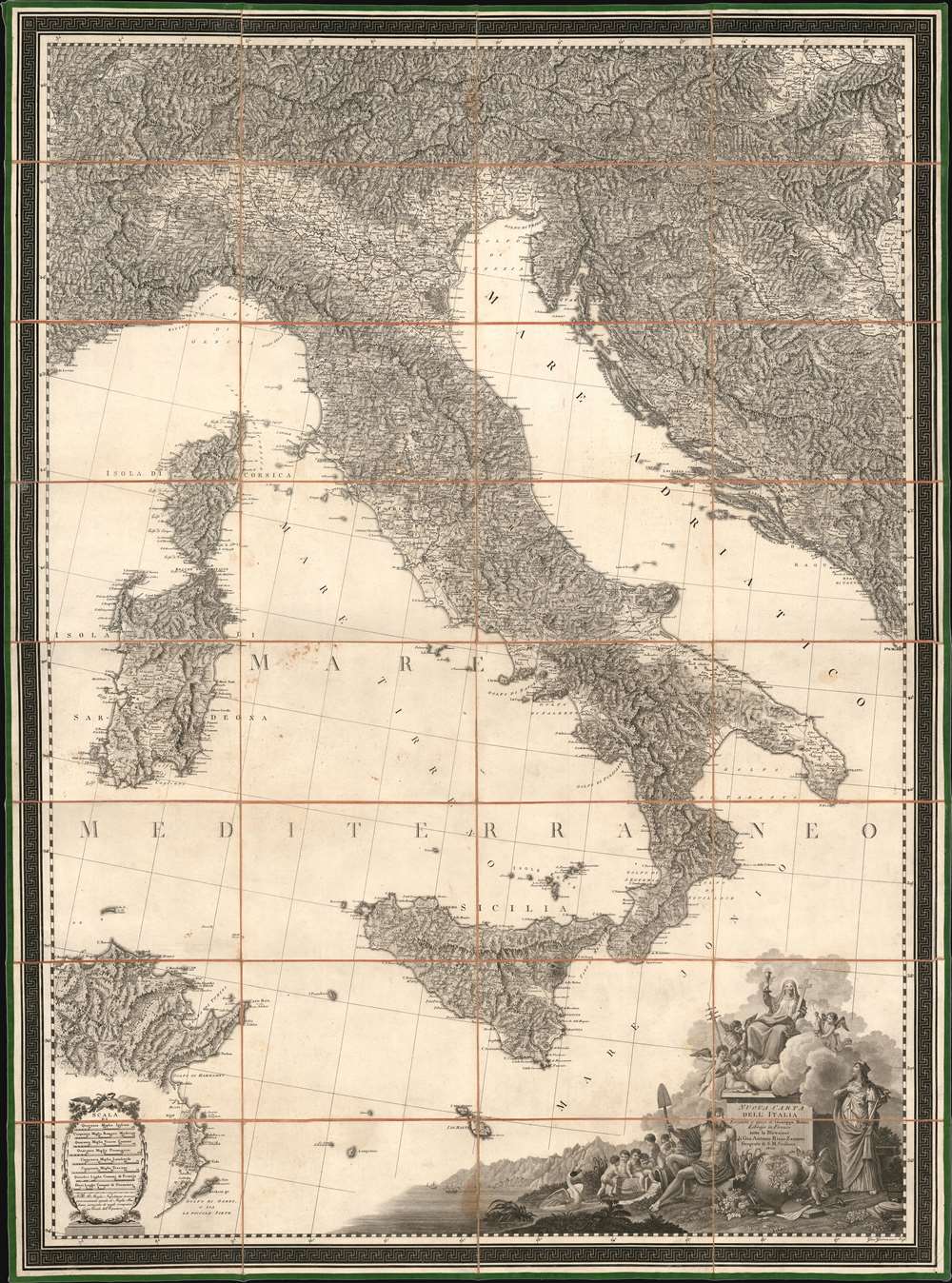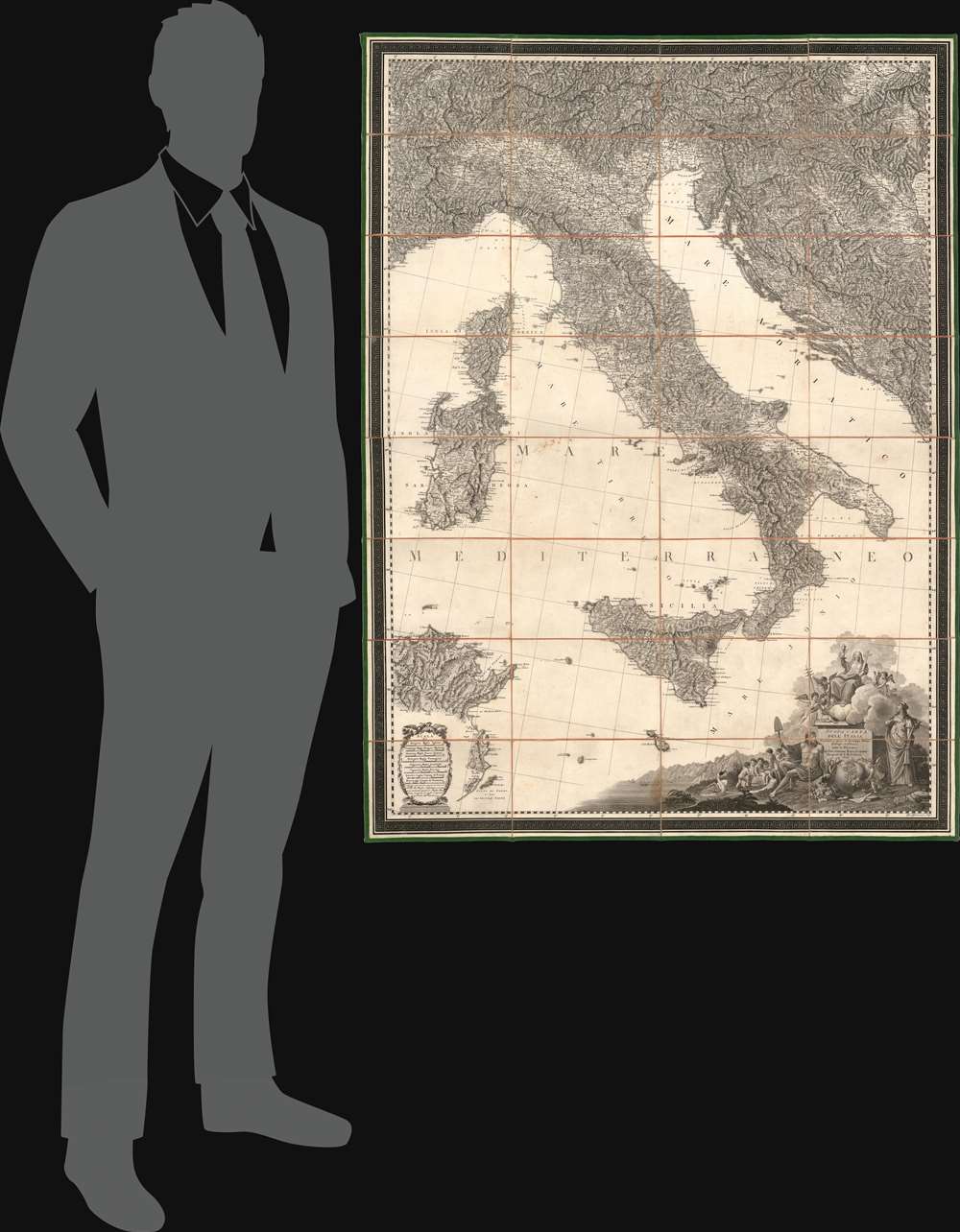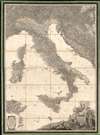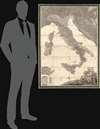This item has been sold, but you can get on the Waitlist to be notified if another example becomes available, or purchase a digital scan.
1802 Rizzi Zannoni Folding Slipcase Map of Italy
Italia-rizzizannoni-1802
Title
1802 (dated) 46.75 x 34.5 in (118.745 x 87.63 cm) 1 : 1250000
Description
A Closer Look
This grand wall map, thus made portable, was printed by the Florentine publisher Giuseppe Molini. Although a splendid map in its own right, it was intended by Rizzi-Zannoni as a promotion for an ambitious (though never executed) subscription-funded, fifteen-sheet atlas of Italy. Unfortunately, only one sheet - the map of Padua - was completed. This monumental work did, nonetheless, garner support for the execution of a superb atlas of the Kingdom of Naples, which Rizzi-Zannoni completed in 1812, two years prior to his death. The map was engraved in Naples by Giuseppe Guerra, whose work also appears in Rizzi-Zannoni’s atlas. And it is in the engraving that this map shines: the mountains, though pictorially represented, are sharply evocative. The lettering is sharp and legible, even amongst the hachured mountainous areas.The map has a superb scale-cartouche at the lower left; at the lower right is an ornate allegorical cartouche with the personifications of the River Tiber, and Europa gazing up at a modestly-veiled cross-and-chalice bearing Ecclesia, representing the primacy of the Catholic Church over Rome specifically and Europe generally. In a baroque touch, the cartouche is positively crawling with putti.
Publication History and Census
This separately-published map is scarce, with only eleven examples catalogued in institutional collections.CartographerS
Giovanni Antonio Bartolomeo Rizzi Zannoni (September 2, 1736 - May 20, 1814) was an 18th century Italian cartographer active in Venice and Naples. Zannoni was born in Padua, Italy on September 2, 1736. Between 1749 and 1751 Zannoni studied Astronomy at the University of Padua under John Polen, a prominent astronomer of the period. After leaving the University, Zannoni was commissioned by the King of Poland, Augustus III, to map that country. Zannoni's subsequent survey is considered the first accurate triangulation of Poland. Afterwards Zannoni's services were in high demand and he traveled around much of Europe, working on various surveys in Denmark, Germany, Prussia, and Sweden. Around 1757 Zannoni was caught up in the hostilities surrounding the Seven Year War and, after one battle, was taken to Paris as a prisoner of war. Paris must have suited Zannoni for he remained for nearly 20 years, even taking service with the Paris Engineer's Office. It was also here in Paris the Zannoni developed the cartographic contacts that would lead to his most prolific cartographic publications, including the Atlas Moderne in conjunction with Lattre. In 1781, Zannoni was called to Naples by the Bourbon monarchy to help in the revision of the Charter of 1769. Afterwards he stayed on and produced a numerous important maps of the Kingdom of Naples. Zannoni is considered a careful and precise cartographer and his work, particularly the maps he made in Naples, have been praised by R.V. Tooley as 'remarkable for a marvelously minute attention to detail, and amply deserves the commendation passed upon it by Sir George Fordham' (Tooley, Maps and Mapmakers, 21). Zannoni would spend the remainder of his days in Naples and passed away on May 20, 1814. More by this mapmaker...
Giuseppe Molini (1772-1856) was a Florentine knight, bookseller, printer, publisher, bibliographer and librarian, active in the late 18th and early 19th century. Clients of Molini's Bookshop in Florence describe Molini as having "an open strongly-marked countenance", a "rare intelligence", and an willingness to share his bibliographical knowledge with any inquirer. The bookshop, a competitor of Galignani's, was located on the Via degli Archibusieri, near the Ponte Vecchio. Molini's Bookshop is known to have stocked a good selection of material in both English and Italian. His prosperous shop focused not only on the active tourist trade but also sold books to dignitaries and royal courts all over Europe. In addition to his retail establishment, Molini was the proprietor of All'insegna de Dante (Dante's Head Press) and Presso G. Molini, located at no. 823 Piazza di St. Maria in Campo. His publishing corpus includes numerous books ranging in scope from a history of Italy to a biography of the Italian artist Benvenuto Cellini. Molini closed his bookshop when he was appointed director of the Biblioteca Palatina which maintained the important book and manuscript collections of the Grand Dukes of Tuscany. Molini held this position until his death in 1856. Learn More...
Giuseppe Guerra (fl. 1800-1860) was a Neapolitan engraver, and Master Engraver within the Kingdom of Naples' Officina Topografica. Not to be mistaken for the Neapolitan painter and forger of the same name, active in the middle of the previous century. Learn More...




